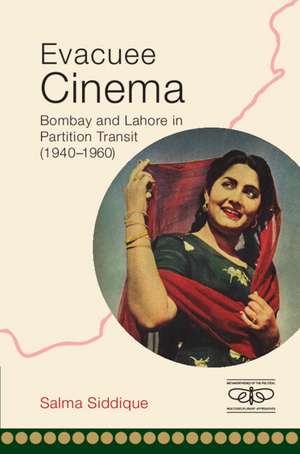Evacuee Cinema: Bombay and Lahore in Partition Transit, 1940–1960: Metamorphoses of the Political: Multidisciplinary Approaches
Autor Salma Siddiqueen Limba Engleză Hardback – 15 feb 2023
Preț: 634.99 lei
Preț vechi: 713.46 lei
-11% Nou
121.51€ • 127.12$ • 100.94£
Carte tipărită la comandă
Livrare economică 02-16 aprilie
Specificații
ISBN-10: 1009151207
Pagini: 276
Dimensiuni: 162 x 236 x 22 mm
Greutate: 0.43 kg
Ediția:Nouă
Editura: Cambridge University Press
Colecția Cambridge University Press
Seria Metamorphoses of the Political: Multidisciplinary Approaches
Locul publicării:Cambridge, United Kingdom
Cuprins
Introduction; 1. The All-India Ambitions of Lahore; Part I. The Secular Stance of Bombay: 2. 'Hindu Camera, Muslim Microphone': A Periodical and Two Memoirs; 3. The Stages of Partition: The Early Years of Prithvi Theatre; Part II. Between Bombay and Pakistan: 4. The Partition wish; 5. The Partition Romance; 6. The Partition Doppelgänger; Conclusion; Bibliography; Index.
Recenzii
'Unearthing stories of the displaced persons who transformed Bombay and Lahore into national film hubs, Salma Siddique brilliantly refutes the notion that amnesia and silence characterised their film industries' response to partition. Delving into popular, archival and private records, Evacuee Cinema offers breathtaking insight into the frenetic world of film stars, crews, companies and theatres altering their creative trajectories to adapt to cataclysmic times. We owe a large debt of gratitude to Siddique for this riveting and immersive account of émigré film personnel whose paths crossed and recrossed the increasing political distance and hostilities between India and Pakistan during the long partition. An indispensable book that reminds us, powerfully, how two vibrant centres of film production were born from the work, life, privation and imagination of migrants and evacuees.' Priya Jaikumar, Author of Where Histories Reside: India as Filmed Space (2019)
Descriere
This new history of partition and South Asian cinema is narrated through the careers of émigré film personnel, as well as through the distinctive genres and ancillary ventures that accompanied the aftershocks of partition. Moving beyond arguments about social contingency and political intent, the book suggests that the creative energies, production and subsequent circulation of popular cinema can offer fresh insights into partition. Pointing to regional connections across national boundaries, this book asserts that the cinemas of India and Pakistan must be explored in tandem to uncover the legacy of partition for the culture industries of the region, one that is not hewn out of national erasures. The leitmotifs of émigré personnel, gossip and satire in film print culture, the partisan repertoire of a theatre company, the film genres of the Muslim social, romantic comedies and charba (remakes), and the unruly film archives of postcolonial nation–states, when accessed through the lens of a divisive decolonization, reveal the parallaxes and confabulations of the 'national' on both sides.







